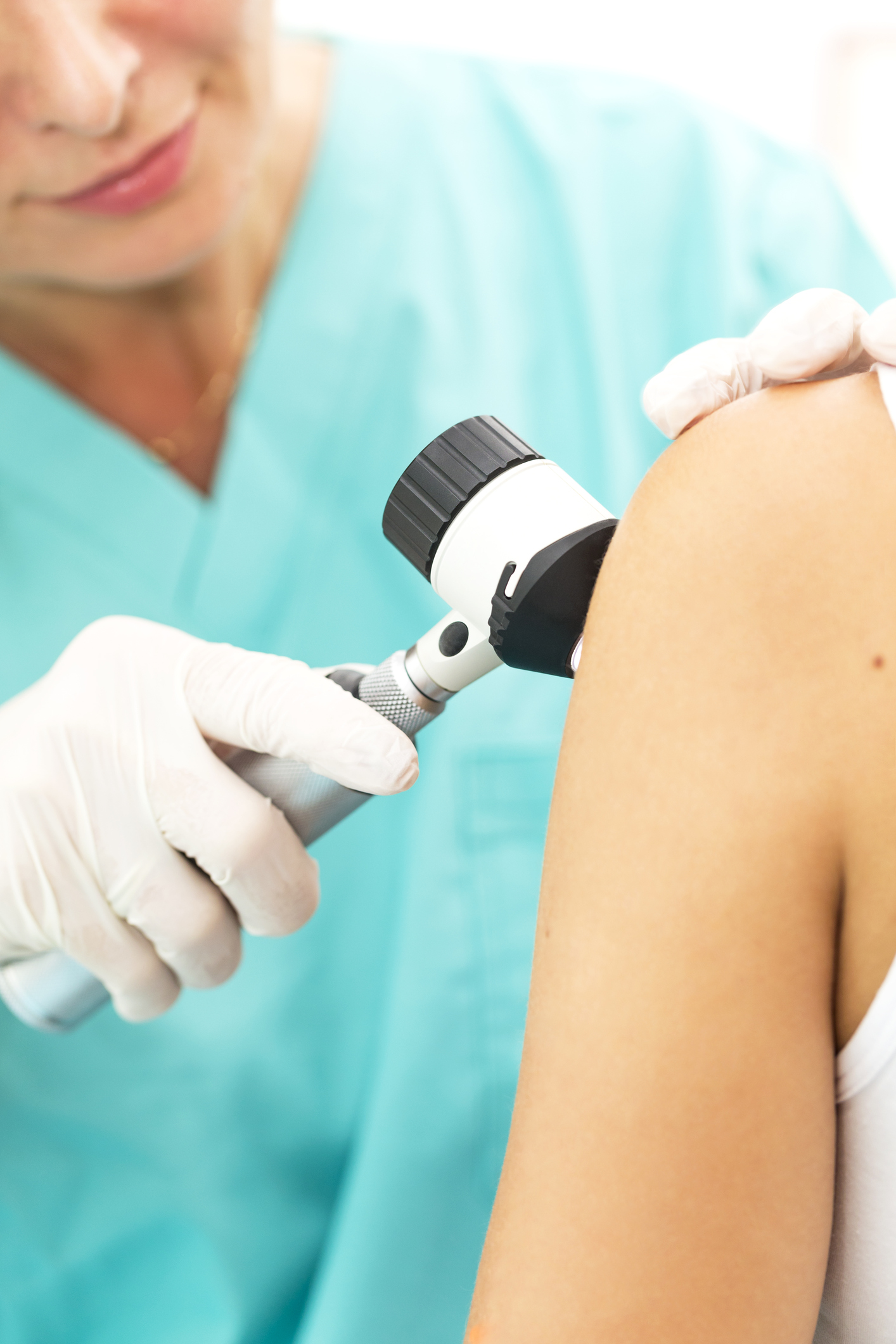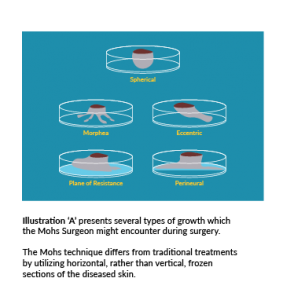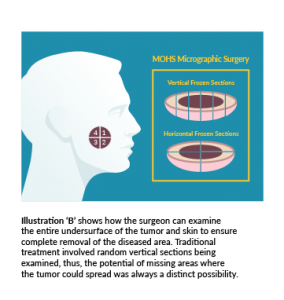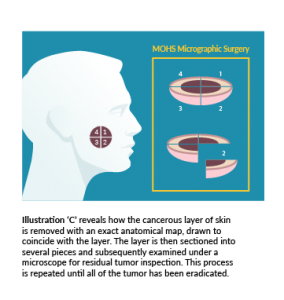Mohs Surgery from U.S. Dermatology Partners
What Is Mohs Surgery?
Mohs surgery offers the highest cure rates for all non-melanoma skin cancers. For certain cases of the most common types of skin cancer — squamous cell carcinoma and basal cell carcinoma — the cure rate can be as high as 99 percent.
Mohs surgery is a highly specialized surgical technique used to treat non-melanoma skin cancers in which the surgeon removes all of the visible cancer, plus a small margin of the surrounding healthy tissue and examines it to ensure that all cancer cells have been removed at the time of surgery.

The Mohs surgery technique treats skin cancers by removing all of the visible cancer. Image Source: newhealthadvisor.com
During Mohs micrographic surgery — named after Dr. Frederic Mohs, who first performed it in the 1930s — cancer is removed from the skin layer by layer until all cancerous cells have been removed. This type of surgery is most commonly used for cancers that have a high risk of re-occurrence. This technique allows for complete removal of the skin cancer while minimizing the removal of surrounding healthy skin.
Find This Service Near You
Who Is a Good Candidate for Mohs Surgery?

Your dermatologist’s decision to use Mohs surgery is based on past history, type of basal cell carcinoma and location of the tumor.
Not all tumors grow as perfect spheres. Tumors may send tentacles of malignancy below the surface of the skin. What makes Mohs surgery different than other methods of removing skin lesions is the microscopic control.
Multiple thin, horizontal layers of the cancer are removed and analyzed without damaging the healthy tissue around and below the legion.
The concept of Mohs surgery has been around for more than 50 years, but the technique has just recently become widely used by dermatologists all over the country. Today, it is universally recognized as a precise and preferred method for treating skin cancers — especially on the face because it causes minimal damage to the surrounding skin.
This technique is also ideal for patients with recurring skin cancers because all of the tumor can be identified and removed with a high degree of accuracy. Individuals with basal cell and squamous cell carcinoma who are at risk for recurrence are most likely to use Mohs surgery.
Skin cancers that are considered high risk and good candidates for Mohs surgery include:
- Recurrent non-melanoma skin cancer
- Tumors larger than 2 cm in size
- Tumors that regrow following previous treatment
- Tumors in high-risk locations or locations where tissue preservation is imperative
- Tumors with poorly defined borders
- Tumors in immunosuppressed patients
Though Mohs surgery has many advantages, it may not be the right treatment for you. Ultimately, the decision to use Mohs surgery is based on past history, type of basal cell carcinoma and location of the tumor. Your dermatologist will consider many factors before determining what treatment is the best for your situation.
How Is Mohs Surgery Performed?
Mohs surgery is typically done on an outpatient basis using a local anesthesic. There is no hospitalization required. Surgery usually begins early in the morning and is finished the same day unless the tumor is extensive.
Your doctor will remove cancer-containing skin, one layer at a time, and examine it under the microscope. He or she will continue removing layers until only cancer-free tissue remains.
After the affected tissue is removed, a pressure dressing is applied to the wound and the patient is transferred to a waiting room area for 20-45 minutes while the tissue is processed and analyzed to see if any cancer cells remain. If additional cells are found, the surgeon will precisely remove additional tissue, repeating the process until all tissue is free of cancer cells.
Are There Side Effects to Mohs Surgery?

Mohs surgery has a 99% cure rate for non-melanoma skin cancers.
The most common side effects are bleeding from the wound, bleeding into the wound, pain and tenderness around the surgical site and, in some cases, infection. Patients sometimes also experience numbness around the surgical area if a muscle nerve is severed during the procedure.
It is uncommon for patients to experience significant pain that cannot be resolved using over the counter pain medication.
Following the procedure, patients should continue a minimum of yearly ongoing visits to their dermatologist, as 50 percent of patients with non-melanoma skin cancer will experience additional skin cancer within five years.
For more information, visit the American College of Mohs Surgery patient education website.
What Post-Operative Care Do I Need After Mohs Surgery?
*Results may vary by individual



